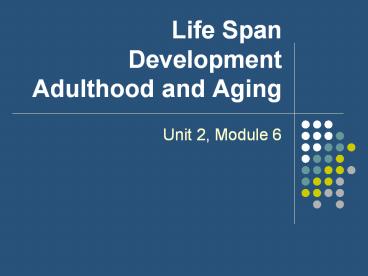Life Span Development Adulthood and Aging - PowerPoint PPT Presentation
Title:
Life Span Development Adulthood and Aging
Description:
Life Span Development Adulthood and Aging Unit 2, Module 6 – PowerPoint PPT presentation
Number of Views:398
Avg rating:3.0/5.0
Title: Life Span Development Adulthood and Aging
1
Life Span DevelopmentAdulthood and Aging
- Unit 2, Module 6
2
Early Adulthood Transitions
- Eriksons Stage 6 Early Adulthood
- Approximate age 20 35
- Questions faced in this stage include
- Independent living/moving out of parents house
- Getting married
- Establishing a career
- Having children
3
Emerging Adulthood
- Developmental Psychologists propose adding a new
stage called emerging adulthood - The transition from adolescence to adulthood
continues to lengthen - Young adults often take longer to establish their
independence
4
The Social Clock
- Societys commonly accepted judgment about the
best timing for certain life events - Getting a drivers license
- Getting married
- Living independently
- Social clocks have different settings in
different cultures - Changes in culture can alter the social clock
within a culture
5
Physical Changes and Transitions
- Middle Adulthood age 36 64
- More noticeable physical changes
- Women experience menopause
- Men experience a decline in testosterone levels
- The mid-life crisis is associated with this
stage - There is no statistical evidence that mid-life
crisis occurs as a result of aging
6
The Fear of Aging
- Why do people fear aging?
- Media impact Older people are often portrayed
in negative ways - Loss of attractiveness
- retin-A generation seeks the quick fix for
physical signs of aging - Confronting mortality
7
Physical Changes
- Later Adulthood age 65 and over
- Senses of sight, smell, and hearing usually begin
a steep decline after age 65 (see figure 6.1,
page 102 in your text) - Decreased muscle strength and stamina
- Immune system weakens
- Decrease in speed of neural (think brainwave)
transmission
8
Compensating for Older Age
- Exercise fosters brain cell development, and
helps prevent heart disease and obesity - Staying mentally active will help brain cell and
neural activity - Brain cell loss is leading cause of memory loss
- If you live to be 80, your brain will weigh 5
less than it does now
9
Diseases Related to Aging
- Alzheimers Disease
- Brain disorder characterized by progressive and
irreversible destruction of brain cells - Results in gradual deterioration of memory,
reasoning, language and physical functioning - Senile Dementia
- Mental disintegration
- Can be caused by alcoholism, tumor, stroke, or
anything that causes substantial loss of brain
cells
10
Age Related Diseases
- Alzheimers has no known cure
- Certain medications can slow down the progression
of the disease - Not every older adult who forgets things has
Alzheimers - Memory loss is a normal part of aging
11
Cognitive Changes and Transitions
- Memory
- Recall memory decreases in older individuals, but
recognition remains relatively stable from age 20
to 60 - Recall memory tasks give no clues to jog your
memory neutral objects/ideas/concepts - Recognition memory tasks involve meaningful
objects/ideas/concepts
12
Intelligence
- Fluid intelligence tends to decrease in later
adulthood - Crystallized intelligence tends to increase with
age - Research indicates that crystallized intelligence
remains stable with age
13
Social Changes Transitions
- The two events that most affect our social
well-being during early and middle adulthood are - Work or Generativity
- Love or Intimacy
- Erikson defines these as being productive (work)
and forming close relationships (love)
14
Lifes Commitments
- Work
- Choosing a career is an important and difficult
decision - Humans have an innate need to be or feel useful
- Contentment and challenge with ones career
choice are central to happiness
15
Lifes Commitments
- Love
- Vital to a happy adulthood
- Lasts longer and is more satisfying when it is
marked by - Intimate self-disclosure (sharing ones self)
- Shared emotional support
- Similar interests and values
16
A Lifetime of Well-Being
- Most older, retired people report happiness and
satisfaction in their lives - The empty nest syndrome often results in a
renewed sense of freedom - Most older individuals experience less emotional
conflict than young adults - Regrets are often about things they didnt do as
opposed to mistakes they made
17
Ageism
- The tendency to categorize and judge people on
the basis of their chronological age - Negative effects of ageism
- Reduces self-esteem
- Reduces ability to participate in society
- Reinforces stereotyping
18
Dying and Death
- Coping with the loss of a loved one is a
challenge that each individual faces at some
point in time - Individual responses will vary
- When the death of a loved one is sudden and
unexpected, individuals may experience profound
grief and depression - Depression can last for years
19
Misconceptions of Death
- The popular belief that expressing strong grief
immediately will lessen grieving period is not
supported by evidence - Stages of Grief
- There is no evidence to support the idea that we
progress through predictable stages
20
Different Perceptions of Death
- Death is perceived differently in different
cultures - In Africa, death is greeted as a way to rejoin
ancestors - Muslim nations expect outward and obvious
expressions of grief over death - In the United States attitudes towards death are
changing towards acceptance and dignity in death
21
Lessons from Mourners
- Can we learn from grief?
- Proves the importance of
- Tending relationships
- Resolving differences
- Expressing appreciation
- Avoiding future regrets by keeping our
relationships healthy in the present
22
Choices About Death
- Hospice Care
- Receiving medical attention in the comfort of
ones home - Terminal patients can spend their remaining days
as pleasantly as possible - Maintains human dignity
- Euthanasia medically assisted death
- What is your opinion?































